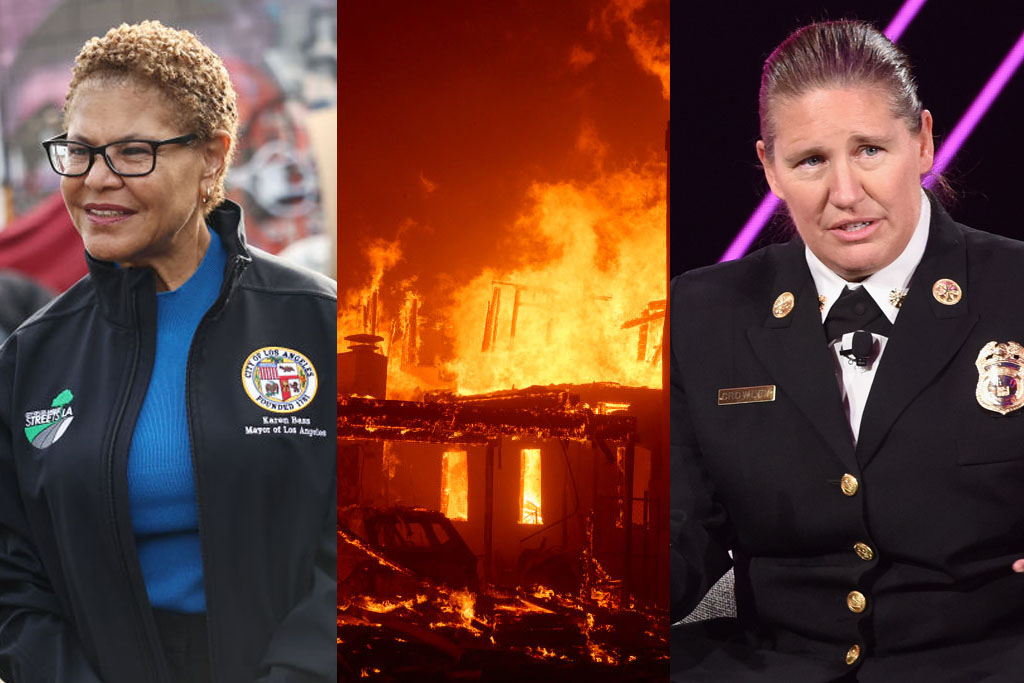The inept politicians who slashed fire department budgets and ignored warnings bear responsibility for engulfing our city in flames.
Wildfires are still burning through my hometown of Los Angeles, displacing thousands of people and ruining billions of dollars of property. The two largest fires, in the Pacific Palisades and Eaton, near Pasadena, are already the most destructive wildfires in the city’s history, burning nearly 30,000 acres over the past two days. In the Palisades area, where some of the most severe destruction has occurred, there were multiple reports of fire hydrants running dry, when water levels in the tanks dropped below the minimum pressure required to surge the water uphill.
Certainly these wildfires may be attributed to some natural factors beyond anyone’s control, like the Santa Ana winds, which not only helped spread the fires but also grounded aircrafts used by firefighters to combat the blaze. Fires of this size and level of destructiveness may also be the result of human settlement and expanding populations—while intense wildfires are a normal part of Southern California’s environmental history, they historically did not destroy communities, because population centers were surrounded by citrus orchards or other environmental buffers. Now, Los Angeles just has homes and residential areas where there were once orchards, meaning that humans are left increasingly vulnerable to fires.
With this said, it appears increasingly clear that city and state officials also bear some degree of responsibility for this horrific situation. Los Angeles mayor Karen Bass shaved $17.6 million from the city fire department’s budget, leading to the fire chief to warn her in a letter sent only last month that this budget reduction would severely diminish the city’s ability to prepare for and respond to large-scale emergencies like wildfires. Bass had initially asked for an even larger cut—$23 million—with the intention of freeing up even more money for the city’s bloated and ineffective programs for the homeless, which draw well north of one billion dollars of city funding. On top of this, the city devoted time, resources, and energy to making DEI one of the fire department’s top priorities—a statement made by their newly appointed lesbian fire chief, Kristin Crowley. And speaking of city priorities, Karen Bass was halfway across the world when the fires broke out, attending the inauguration of the new president of Ghana. When she returned, the inept Bass delivered an emergency press conference, directing anyone seeking assistance to “URL,” a blooper that might have been funny if it weren’t coming amid scenes of horrific loss and destruction. Crowley herself was not shy about criticizing the mayor, saying bluntly in a post-wildfire interview with FOX 11 that city officials “failed” the fire department and that they did not receive proper funding.
On top of the city’s progressive ineptitude, there are also allegations that Los Angeles and California failed its people in more serious environmental ways by neglecting to adequately prepare for fires. California has been extraordinarily slow in constructing the additional water reservoirs recommended to combat and plan for wildfires. For instance, the state has been planning to build the Sites Reservoir, which would provide agricultural and firefighting water to southern California, for 40 years. State voters had even approved $2.7 billion for water storage projects a decade ago in 2014. But the project is not expected to be completed until at least 2030, owing to the extraordinarily slow process of planning, permitting, and environmental review in the blue state. Bureaucratic obstacles also prevented California from conducting the necessary controlled burns—despite governor Gavin Newsom promising on his first day in office to “step up our game” at forest thinning and other mitigation efforts to protect vulnerable areas from fire. Instead, Newsom slashed the state’s fire prevention budget by nearly $150 million, claiming in a bold-faced embellishment that California had treated 90,000 acres under his reign—though the true figure was closer to 12,000. A 2021 NPR report found that the state’s overall fire prevention work that year, the worst wildfire season on record for California at the time, had dropped by half—and, clearly, did not pick up in subsequent years.
For now, we must all send prayers and any resources we can give to the brave firefighters fighting to protect homes and citizens who have experienced great loss. But eventually, it will be time for a reckoning. Californians should understand the root of this tragedy and the policies that likely accelerated it so they can rebuild accordingly. In fact, many people in our deep blue state are already directing ire at the politicians who have failed so many people, and the leftist policies of overregulation, bureaucratic strangleholds, and budget slashing that crippled the city’s resources and preparedness. And this is before countless Californians embark on the heartbreaking project of rebuilding their homes, when they will have to battle the layers and layers of red tape, permitting, and so-called environmental regulation necessary to build in this area. Many commentators are predicting that this could be the watershed moment that brings a red wave, and as more and more political failures are uncovered, it certainly seems that they could be right. The public officials who slashed resources, misdirected funds, and failed to act with appropriate initiative should be held culpable for this disaster, because taking them to account and throwing our support behind better, more competent leaders may help prevent another disaster in the future.
Dr. Sheila Nazarian is a MMM Board Certified Plastic Surgeon and Assistant Professor, USC.




